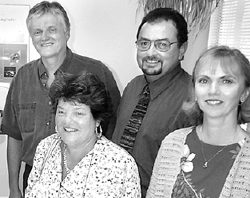|
|
|

Home > For Patients > General Information > Frequently Asked Questions
- What is Nuclear Medicine?
- What is nuclear medicine used for?
- How much radiation will I be exposed to?
- What is our philosophy on patient care?
- Are there regulations governing our practice?
- What type of community commitment do you provide?
What is Nuclear Medicine?
Nuclear medicine is a unique medical specialty that employs very small amounts of radioactive substances, known as radiopharmaceuticals, which concentrate in specific organs when administered to a patient.
Normally these radioactive drugs are given to the patient by injection into an arm vein, but a small number are given to the patient by radioactive capsule. The localization of the radiopharmaceutical in the desired organ requiring the test is dependent on the nature of the radiopharmaceutical itself, upon blood supply to the organ and to the level of function of the targeted organ. You can tell a lot about the size, shape, position and function of different organs by using radioactive drugs. Once the patient has received the radioactive drugs, they are then the source of radiation, and are emitting gamma rays. The patient is positioned under a machine called a gamma camera, which is just a big radiation detector and does not, itself, emit radiation. The gamma camera turns the radioactive signals into images of the organ that is being tested. With the computers that are available now, the technologist can also measure organ function.
For example, on one type of heart study they can see the walls of the heart move with every heart beat and measure what percentage of blood in the heart is being pumped out with every heart beat.
The gamma camera can also produce images that look something like a CAT scan. The patient has pictures taken at 360 degree around the body and then the computer programs create images that are like taking the organ out of the body and slicing it up on 3 different planes.
 Back
to the top. Back
to the top. |
 |
|
|
What is nuclear medicine used for?
Some of the major applications of nuclear medicine include:
evaluation of heart disease
brain, kidney, lung and thyroid function
determining the location and progression of tumors before and after treatment.
Patients are typically exposed to very low levels of radiation for only a short period of time.
Radioactive drugs are also used to treat diseased cells such as cancer cells and destroy them.
 Back
to the top. Back
to the top.
How much radiation will I be exposed to?
The amount of radiation used in the radiopharmaceuticals is small and similar to that given by other diagnostic x-ray tests. The effective adult radiation dose to your whole body is approximately the same dose the average person living in the United States receives in 2 to 3 years from cosmic rays and naturally occurring background radiation sources. The radiation dose is about 15% of the yearly dose
considered safe for doctors and technologists who work with radiation. Please urinate frequently for 24 hours after any tests where radiopharmaceuticals were ingested or injected to lessen the radiation exposure. You can be around other people and use a bathroom normally without risk to others.
What is our philosophy on patient care?
The staff and physicians of Norfolk Nuclear Medicine are dedicated to supplying the patients and physicians of this area with the highest quality diagnostic testing available. Our staff and physicians are highly qualified and maintain their expertise by frequent attendance at continuing medical education conferences and seminars.
 Back
to the top. Back
to the top.
|
|
|
|
Are there regulations governing our practice?
Norfolk Nuclear Medicine Inc. is licensed by and operates in full compliance
with all regulations of The
Canadian Nuclear Safety Commission. The Ministry of Health and Long
Term Care also license us as an Independent Health Facility. Our facilities
are inspected at least once every licensing period by assessors from the
College of Physicians and Surgeons, under the direction of the Provider
Services Branch of the Ministry of Health and Long Term Care. These inspections
include a complete review of the premises, equipment, staff qualifications,
policy and procedures and diagnostics images and reports. The most recent
inspection report confirms, "Norfolk Nuclear Medicine Inc. is a top-quality
facility, with good policies and procedures, excellent equipment and a
history of supplying an excellent service to the patients and physicians
of this area."
 | | NNMS owners George and Teresa Kapitor (right) show off new imaging equipment to Norfolk Mayor Rita Kalmbach and MPP Toby Barret |
What type of community commitment do you provide?
The owners of Norfolk Nuclear Medicine Inc. have made the personal and financial commitment necessary in order to supply the Haldimand, Norfolk, Oxford and Brant area with the latest in medical technology. Norfolk Nuclear Medicine strives to work in cooperation with other health care providers in the community and supports several charitable organizations, such as the Norfolk General Hospital Building Fund, Tillsonburg Hospital Extravaganza and Delhi Medical Centre Building Fund. We also offer cooperative training placements to students from the Grand Erie District School Board, Fanshawe College in Simcoe and Mohawk College in Hamilton.
 Back to the top.
Back to the top.
|




